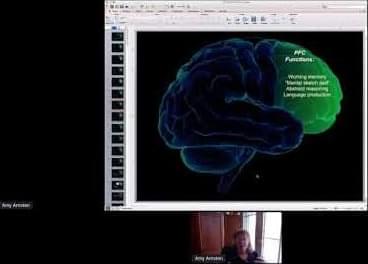Learn more about the Cognitive Science Student Association and the California Cognitive Science Conference at https://cssa.berkeley.edu.
Amy Arnsten — Yale University.
Abstract.
The recently evolved prefrontal cortex (PFC) subserves many of our highest-order cognitive functions, generating and sustaining the mental representations that underlie working memory, abstract reasoning, and top-down control of thought, action, and emotion. Due to the pioneering research of Patricia Goldman-Rakic, we have learned much about the neural basis underlying the ability of the dorsolateral prefrontal cortex (dlPFC) to generate mental representations, where microcircuits in deep layer III have extensive recurrent excitatory connections to maintain neuronal firing in the absence of sensory stimulation, while GABAergic interneurons provide lateral inhibition to refine the contents of working memory. However, these dlPFC circuits are also tremendously dependent on arousal state, with a narrow inverted U response to levels of acetylcholine, dopamine and norepinephrine. Even quite mild uncontrollable stress increases the release of dopamine and norepinephrine in the PFC, which rapidly impairs PFC functioning by 1) stimulating D1 and alpha-1-receptors, respectively, 2) these, in turn, activate feedforward calcium-cAMP signaling within spines, which then 3) open nearby potassium channels to disconnect PFC networks and take the PFC “off-line”. With chronic stress exposure, there is actual atrophy of PFC dendrites and spines. Understanding the neural events that weaken vs. strengthen PFC connectivity and function has led to the development of treatments for patients with stress-related PFC dysfunction, e.g. guanfacine and prazosin. This knowledge is also helping to illuminate the etiology of cognitive disorders, as genetic insults in schizophrenia often increase the activity of these stress signaling pathways, and the molecules that regulate the stress signaling pathways are lost with advancing age, leading to tau pathology as seen in Alzheimer’s disease.










Leave a reply